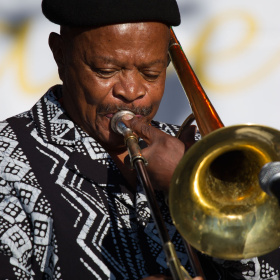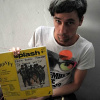Jonas Gwangwa
Bio
Jonas Mosa Gwangwa (1937-2021) was an important figure in South African jazz.
Born in 1941 in Orlando East, Soweto, Gwangwa first rose to prominence playing trombone with The Jazz Epistles. In 1961, Gwangwa left his home country to tour England with the hit musical 'King Kong'. When the tour ended, he ventured to the US to further his education at New York’s prestigious Manhattan School of Music. He continued to live in the US for 15 years, finding recognition thanks to legend Harry Belafonte and featuring in 1965 in the Sound Of Africa concert at Carnegie Hall alongside Miriam Makeba, Hugh Masekela and Letta Mbulu.
Exiled and an official "enemy of the state" for many years, Gwangwa settled in Botswana in the early 1980s as part of the Medu ensemble until he narrowly escaped death in 1985 in a cross-border raid by apartheid forced. He is perhaps best known for his work as composer, arranger and musical director of Amandla, the ANC cultural ensemble tour to which he devoted 10years of his life and travelled the world.
Gwangwa joined forces with George Fenton to create the original score and theme song for the Richard Attenborough film 'Cry Freedom', about the life of Steve Biko. At the 60th Annual Academy Awards in 1988 he performed his nominated song ‘Cry Freedom’. Also in 1988 he performed at the Nelson Mandela 70th Birthday Tribute at Wembley Stadium.
In 1991, he returned to South Africa and in 1997 composed the theme for South Africa’s Olympic bid. His later albums include 'A Temporary Inconvenience' (2000) and 'Flowers Of The Nation' (2001). Hehas performed all over the world and received countless awards, including lifetime achievement awards and honorary doctorates. He passed away on 23 January 2021 at the age of 83.

























